

Diffuser ses travaux sur les réseaux sociaux académiques ou sur des archives ouvertes ? Le succès des réseaux sociaux destinés aux chercheurs ne se dément pas.
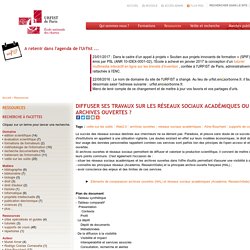
Paradoxe, et preuve sans doute de ce succès, de plus en plus de chercheurs et d'institutions en appellent à une utilisation vigilante. Les doutes existant en effet sur leurs modèles économiques, le droit des documents déposés ou encore leur usage des données personnelles rappellent combien ces services sont parfois loin des principes de l'open access et et ne sont pas des archives ouvertes.Si archives ouvertes et réseaux sociaux permettent de diffuser et valoriser la production scientifique, il convient de mettre en lumière leurs différences et leurs points communs.
C'est également l'occasion de :- situer les réseaux sociaux académiques et les archives ouvertes dans l'offre d'outils permettant d'assurer une visibilité à ses travaux sur le web ;- connaître les principaux réseaux (Academia, ResearchGate) et la principale archive ouverte française (HAL) ;- avoir conscience des enjeux et des limites de ces services. 10 online social network options for educators. Professors and K-12 teachers may not always socialize in the same places that their students do, but their networks are just as important to their lives and careers.

The Chronicle of Higher Education recently compared some of the more prominent social sites available to educators, and the sites they looked at, such Academia.edu and Mendeley, offer lots of options for research and collaboration. Education Dive decided to drill a bit deeper and look at what else is out there, as well as what the best options are for educators and graduate students in the sciences or humanities. Here are 10 education-related options for faculty and students who want to bolster their contact lists or crowd-source questions about lab results and historical documents. 1.
Social Networks for Academics Proliferate, Despite Some Scholars' Doubts - Technology. By Katherine Mangan As a medieval historian with some decidedly old-school habits, Guy Geltner wanted to expand his online presence, but he shuddered at the thought of "friending" or "Tweeting" to get other scholars' attention.
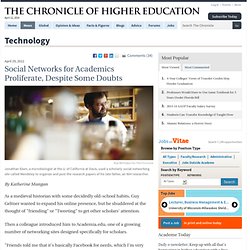
Then a colleague introduced him to Academia.edu, one of a growing number of networking sites designed specifically for scholars. "Friends told me that it's basically Facebook for nerds, which I'm very happy with," says Mr. Geltner, a professor of medieval history at the University of Amsterdam. The profile he set up includes far more information than his university's Web page could accommodate, including links to research papers, books, blogs, and forthcoming talks. Still, he isn't averse to helping out a scholar in need. The past five years have seen a proliferation of sites like Academia.edu, which, with 1.2 million registered users, is one of the heavyweights in the field.
Social networking with a brain: a critical review of academic sites. Social networking may have started out as a way for students to keep track of their friends, but it has expanded in just about every direction.
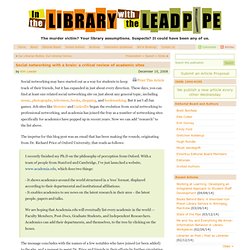
These days, you can find at least one related social networking site on just about any general topic, including music, photography, television, books, shopping, and bookmarking. But it isn’t all fun games. Job sites like Monster and LinkedIn began the evolution from social networking to professional networking, and academia has joined the fray as a number of networking sites specifically for academics have popped up in recent years. Now we can add “research” to the list above. The impetus for this blog post was an email that has been making the rounds, originating from Dr. I recently finished my Ph.D on the philosophy of perception from Oxford. The message concludes with the names of a few notables who have joined (or been added) to the site, and a request to assist Dr.
A screen shot of Academia.edu's homepage. The Good The Bad The Ugly. Mendeley - Free reference manager and PDF organizer. Academia.edu - Share research. ResearchGate. Figshare - credit for all your research. About Social Psychology Network. Social Psychology Network (SPN) is an educational organization with over 3,500 members worldwide.
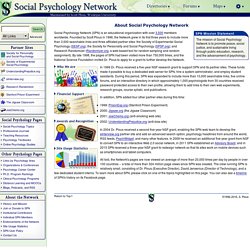
Founded by Scott Plous in 1996, the Network grew in its first three years to include more than 3,500 searchable links and three affiliated partner sites: the Society of Experimental Social Psychology (SESP.org); the Society for Personality and Social Psychology (SPSP.org); and Research Randomizer (Randomizer.org, a web-based tool for random sampling and random assignment). By late 1998, the pages of SPN had been visited more than 750,000 times, and the National Science Foundation invited Dr.
Plous to apply for a grant to further develop the Network. In 1999 Dr. Plous received a five-year NSF research grant to support SPN and its partner sites. LINGUIST List. ESA - European Sociological Association - Research Networks. About H-Net. This site will look much better in a browser that supports web standards.

An international consortium of scholars and teachers, H-Net creates and coordinates Internet networks with the common objective of advancing teaching and research in the arts, humanities, and social sciences. H-Net is committed to pioneering the use of new communication technology to facilitate the free exchange of academic ideas and scholarly resources. Scholar Universe - Database of scholar profiles for published academic faculty, medical researchers and scientific experts. Savoirs en partage - Agence universitaire de la Francophonie. Bienvenue sur le répertoire des chercheurs francophones de l'Agence universitaire de la Francophonie (AUF).
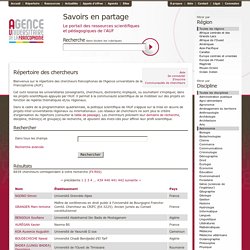
Scholars at Risk Network. About.